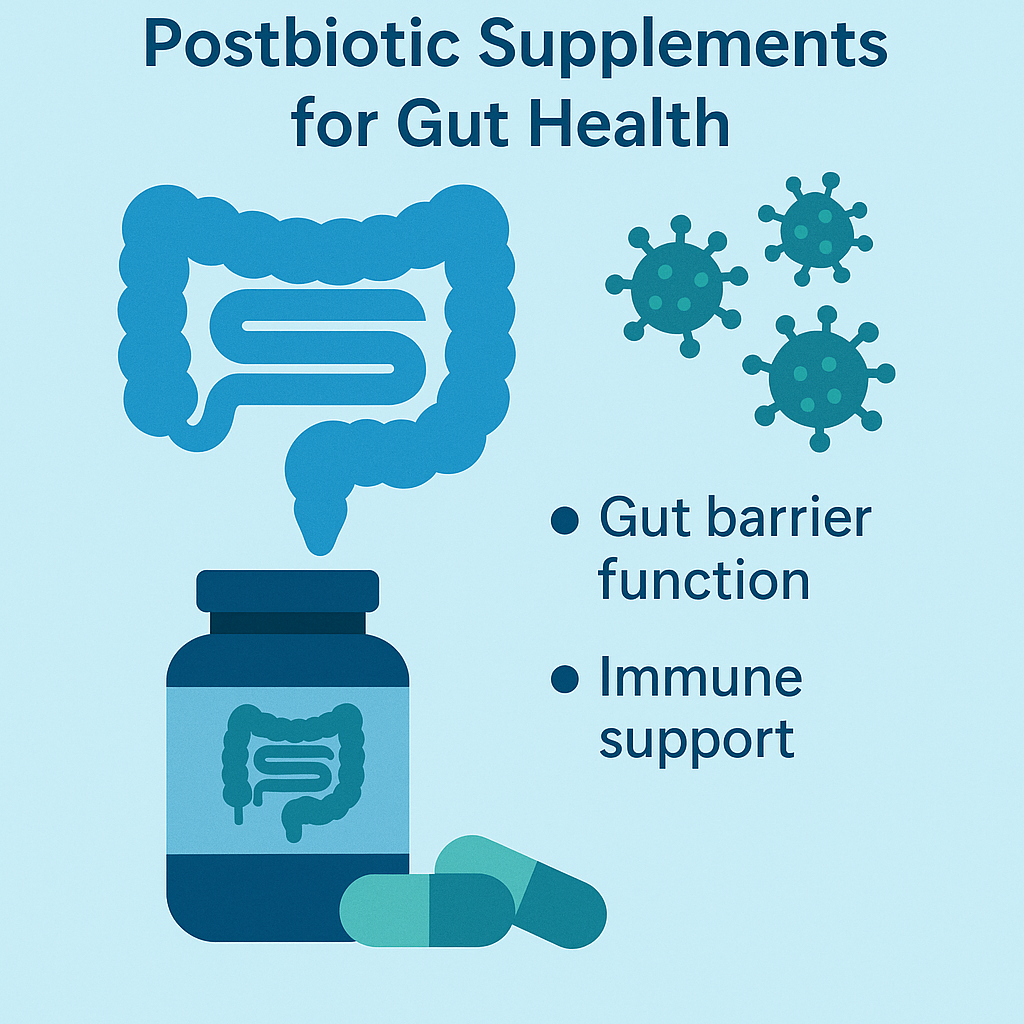Contents
ToggleUnderstanding the Gut Microbiome
The human gut is more than just a digestive organ—it’s a living ecosystem. The gut microbiome refers to the trillions of bacteria, viruses, fungi, and other microbes that live in your digestive tract. These tiny organisms help break down food, absorb nutrients, regulate your immune system, and even influence your mood and brain function.
Maintaining a healthy balance in this microbial community is essential. Factors like poor diet, stress, lack of sleep, and antibiotics can disrupt the balance, leading to digestive problems, chronic inflammation, and weakened immunity.
What Are Postbiotics?
While many people are familiar with probiotics (live bacteria) and prebiotics (fiber that feeds these bacteria), postbiotics are the next evolution in gut health. Postbiotics are the byproducts or “metabolites” that probiotic bacteria produce after they digest prebiotics.
They are not alive like probiotics, but that’s what makes them so powerful. Being non-living means postbiotics are more stable, safe, and easier to store and transport—no refrigeration required.
These compounds include:
-
Short-chain fatty acids (like butyrate and acetate)
-
Enzymes
-
Peptides
-
Cell wall fragments
-
Organic acids
Together, these components help regulate inflammation, support the gut barrier, and stimulate immune responses.
Postbiotics vs Probiotics vs Prebiotics
Here’s a simple breakdown:
| Type | Definition | Role |
|---|---|---|
| Prebiotics | Non-digestible fibers (like inulin) that feed good bacteria | Fuel for probiotics |
| Probiotics | Live microorganisms that benefit health when consumed | Improve microbial balance |
| Postbiotics | Bioactive compounds produced by probiotics | Direct support for gut and immune health |
They all work together, but postbiotics are the final product—essentially the “active ingredient” that delivers the health benefits.
Benefits of Postbiotic Supplements
Postbiotic supplements are emerging as a promising solution for many gut-related issues. Their benefits include:
-
Strengthening the gut barrier: Prevents harmful substances from leaking into the bloodstream (leaky gut syndrome).
-
Reducing inflammation: Especially in conditions like IBS and IBD.
-
Supporting immune function: Enhances the body’s response to infections and regulates overactive immune reactions.
-
Stabilizing the microbiome: Promotes a healthy microbial balance without introducing live bacteria.
-
Improving nutrient absorption: Enhances the uptake of minerals and vitamins.
These benefits make postbiotics ideal for individuals who can’t tolerate probiotics or need a stable, predictable supplement.
How Postbiotics Work in the Body
Postbiotics function at a cellular level to create a more resilient gut environment. Here’s how:
-
Modulation of the immune system: Postbiotics stimulate immune cells like macrophages and T-cells, improving the body’s ability to detect and fight off pathogens without causing excessive inflammation.
-
Enhancing the gut barrier: They increase the production of mucin and tight junction proteins, which protect the intestinal lining and prevent toxins from entering the bloodstream.
-
Production of short-chain fatty acids (SCFAs): SCFAs like butyrate are crucial for feeding colon cells, lowering colon pH, and inhibiting the growth of harmful bacteria.
Their effects are not only localized to the gut—some postbiotics can have systemic benefits, affecting mood, metabolism, and even skin health.
Scientific Research Behind Postbiotics
In recent years, scientific interest in postbiotics has surged. Here are some key findings:
-
A 2022 clinical trial published in Nutrients found that a heat-killed strain of Lactobacillus improved gut symptoms in patients with irritable bowel syndrome (IBS).
-
Another study in 2021 observed that postbiotic SCFAs helped reduce systemic inflammation markers in individuals with metabolic syndrome.
-
Researchers from Harvard Medical School have highlighted the safety and stability of postbiotics, especially for immunocompromised patients who cannot take live probiotics.
These studies suggest that postbiotics may be a safer and more effective option, particularly for long-term gut health maintenance.
Who Should Consider Postbiotic Supplements?
Postbiotics offer benefits for a wide range of people:
-
Individuals with sensitive stomachs or IBS: They help reduce bloating, gas, and cramping without the risk of introducing live bacteria.
-
Immunocompromised individuals: Since postbiotics are non-living, they pose no infection risk.
-
People recovering from antibiotic use: Postbiotics help rebuild gut integrity and reduce dysbiosis.
-
General health seekers: Anyone looking to support gut immunity, nutrient absorption, or overall wellness can benefit.
Best Postbiotic Supplement Ingredients
High-quality postbiotic supplements typically contain:
-
Short-chain fatty acids (SCFAs) like butyrate and acetate
-
Bacterial cell wall components such as peptidoglycans and lipoteichoic acid
-
Bacteriocins – naturally occurring antimicrobial peptides
-
Heat-killed probiotic strains (e.g., Lactobacillus plantarum, Bifidobacterium longum)
-
Postbiotic metabolites including organic acids and antioxidants
When shopping for supplements, look for these ingredients on the label for maximum efficacy.
How to Choose a Quality Postbiotic Supplement
Not all supplements are created equal. Here’s what to watch for:
| Factor | Why It Matters |
|---|---|
| Label transparency | Should list all active postbiotic compounds clearly |
| Third-party testing | Ensures purity, potency, and absence of contaminants |
| Brand reputation | Trusted companies are more likely to follow rigorous quality standards |
| Stability & packaging | Postbiotics should be shelf-stable and not require refrigeration |
| No unnecessary fillers | Avoid products with excessive binders or artificial additives |
Always consult a healthcare provider before starting any new supplement regimen.
Potential Side Effects and Safety
Postbiotics are generally considered very safe. However, some users may experience:
-
Mild gas or bloating in the first few days
-
Allergic reactions if sensitive to specific metabolites
-
No known risk of infection (unlike some live probiotics)
Who should avoid postbiotics?
-
Those with known allergies to bacterial proteins
-
People already taking immunosuppressive medications (consult a doctor first)
Dosage and How to Take Postbiotics
Typical postbiotic supplements are taken in capsule or powder form, once or twice daily. While dosage varies by brand, most products offer:
-
500 mg to 1,000 mg per serving of heat-treated bacteria or purified metabolites
Best practices:
-
Take with food to reduce any potential GI discomfort
-
Stay hydrated
-
Consistency is key for long-term gut health results
Foods That Naturally Contain Postbiotic Compounds
While postbiotic supplements are convenient, you can also boost levels naturally through diet:
-
Fermented foods: Miso, kimchi, sauerkraut, kefir
-
Prebiotic-rich foods: Bananas, garlic, onions, oats (help feed gut bacteria to produce postbiotics)
-
Fiber-heavy meals: These promote SCFA production by gut microbes
Eating a balanced diet helps your gut produce its own postbiotics continuously.
Integrating Postbiotics Into Your Daily Routine
Incorporating postbiotics into your lifestyle doesn’t have to be complicated. Here’s how to do it effectively:
-
Start your day with a postbiotic supplement alongside your breakfast. This can help reduce bloating and improve digestion throughout the day.
-
Combine with a prebiotic-rich diet, including fiber-packed vegetables, fruits, and whole grains, to encourage your body to produce more natural postbiotics.
-
Avoid overuse of antibiotics when unnecessary, as they can hinder your gut’s ability to generate postbiotics naturally.
-
Practice stress-reducing techniques such as mindfulness, yoga, or journaling. Chronic stress affects gut health and may limit the benefits of your supplements.
-
Stay consistent. The benefits of postbiotics build over time, so daily use is key to long-term results.
Myths and Misconceptions About Postbiotics
Despite their benefits, postbiotics are often misunderstood. Let’s debunk some common myths:
-
“Postbiotics are just waste products.”
Not true. While they are byproducts of probiotic activity, many of these compounds are biologically active and beneficial to human health. -
“Only live bacteria (probiotics) can help the gut.”
Scientific studies have shown that the metabolites from probiotics—postbiotics—can have equal or even greater impacts in some situations. -
“If I eat fermented food, I don’t need postbiotics.”
Fermented foods are great, but the concentration and consistency of postbiotics in supplements are usually much higher and more targeted.
Top-Rated Postbiotic Supplements to Try in 2025
If you’re considering trying a supplement, here are a few top-rated products based on formulation, reviews, and scientific backing:
| Product Name | Key Features |
|---|---|
| Pendulum Akkermansia | Contains pasteurized Akkermansia muciniphila strain |
| Microbiome Plus+ Postbiotic | Includes butyrate-producing postbiotics and fiber |
| Seed Daily Synbiotic | Combines prebiotics, probiotics, and postbiotic compounds |
| Just Thrive Precision Prebiotic & Postbiotic | Helps with immune and gut barrier support |
Look for clinically studied ingredients and third-party testing when selecting a supplement.
Expert Opinions on Gut Health and Postbiotics
Leading researchers and nutritionists are enthusiastic about the future of postbiotics:
-
Dr. William Davis, cardiologist and gut health expert, explains: “Postbiotics represent a smart, targeted way to gain benefits from probiotics—without the risks or storage issues of live cultures.”
-
Nutritionist Emily Kyle, MS, RDN says: “For my clients with autoimmune conditions or IBS, postbiotics provide a safe, effective way to improve gut function.”
Even institutions like the International Scientific Association for Probiotics and Prebiotics (ISAPP) are now promoting the classification and awareness of postbiotics.
Frequently Asked Questions (FAQs)
Q1: Are postbiotics safe for kids?
Yes, in most cases. However, consult with a pediatrician before starting any supplement.
Q2: Can I take postbiotics with probiotics?
Absolutely. They can work synergistically to enhance overall gut health.
Q3: Do postbiotics help with bloating?
Yes, many users report reduced bloating and gas due to their anti-inflammatory properties.
Q4: How long before I see results?
Most people notice improvements in digestion and energy levels within 2–4 weeks.
Q5: Can I get enough postbiotics from food?
You can get some from fermented foods, but supplements offer a more concentrated and consistent dose.
Q6: Are there vegan-friendly postbiotic supplements?
Yes, many postbiotic products use non-animal ingredients and are labeled accordingly.
Conclusion: Are Postbiotic Supplements Right for You?
If you’re looking for a stable, safe, and powerful way to support your gut health, postbiotic supplements for gut health could be an ideal choice. They offer the therapeutic benefits of probiotics without the risks associated with live bacteria, making them perfect for a broad range of users—including those with sensitive systems.
With growing scientific support and improved supplement formulations, postbiotics are quickly becoming a top choice for those who take their gut health seriously. Whether you’re dealing with digestive discomfort or just aiming to improve your overall well-being, consider adding a postbiotic to your wellness routine.
🔗 External Resource: Learn more from the International Scientific Association for Probiotics and Prebiotics (ISAPP).



